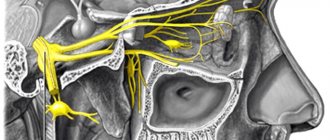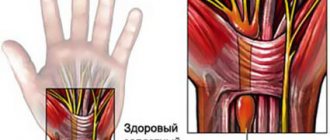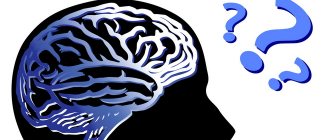Memory allows a person to store information about his past experiences. But as a result of certain events, for example, due to illness or injury, it may fail. In this case, doctors diagnose a memory disorder, one of the forms of which is retrograde amnesia.
- The essence of the disease
- Causes
- Symptoms
- Treatment
Definition of the concept
Retrograde amnesia is a memory disorder in which the patient cannot remember events that preceded the onset of the disease. As a rule, the patient normally remembers everything that happened after exposure to the damaging factor.
Sometimes retrograde amnesia is combined with anterograde amnesia. In this case, the patient does not remember events that occurred both before and after the onset of the disease.
Most often, older people learn for themselves what retrograde amnesia is. In the presence of provoking factors, the disease can occur at any age.
General information
This form of amnesia was first described by the Russian psychiatrist S.S. Korsakov, who, while studying severe alcohol poisoning, drew attention to the severe memory impairment observed in patients.
The combination of severe anterograde and retrograde amnesia that occurs with alcohol poisoning, after the publication of Korsakov’s work “On Alcoholic Paralysis” in 1887, entered the scientific literature under the name “Korsakov syndrome.”
In 1900, V. M. Bekhterev described paroxysmal retrograde amnesia. Bekhterev identified this type of amnesia in a patient who had suffered a stroke, so he considered this type of memory impairment as a syndrome of epileptiform origin (arising as a result of organic brain damage).
Causes
In the vast majority of cases, retrograde amnesia occurs due to cerebral hypoxia. Lack of oxygen can be caused by impaired blood supply due to disease, tumors or injury. In some cases, the cause lies in exposure to toxins or a lack of vitamin B1. In all these cases, amnesia is organic in nature.
Sometimes memory loss is caused by negative psychological influences.
Retrograde amnesia, along with disorientation and false memories, is part of Korsakoff's syndrome.
Organic
The most common organic causes of brain dysfunction are:
- traumatic brain injuries of any severity;
- benign and malignant brain tumors;
- poisoning, such as carbon monoxide and certain medications;
- encephalopathy;
- cessation of breathing due to suffocation, drowning, electrical trauma;
- circulatory disorders caused by atherosclerosis, hypertension;
- infectious encephalitis.
Interesting: Sudden memory loss: causes and types of amnesia
Psychological
Psychological reasons include:
- acute psychoses;
- emotional shock;
- some mental pathologies.
What is anterograde amnesia?
Antegrade amnesia is a violation of memorization and storage of received information, in which the patient forgets events that occurred after an illness or traumatic brain injury.
Disturbance in the movement of information from cells of short-term storage to sections of long-term storage causes amnesia of an anterograde nature. Due to the problem of establishing new interneuron connections, memorization is blocked. Previously acquired knowledge is retained. The victim remembers everything that preceded the painful condition, but new connections between nerve cells are not formed.
The result of the condition is the patient’s confusion due to the inability to adequately interact with others and correctly respond to current events.
Kinds
There is a classification of retrograde amnesia based on the causes, form and duration of memory loss.
By shape
- Complete loss of memory. Characterized by the complete loss of memories of a long period of time, only basic knowledge about the world remains.
- Partial amnesia. Fragments of memories are preserved.
- Temporary. Occurs during trauma, sometimes after electroconvulsive therapy. Memories of a short period of time are lost. In rare cases, it drags on for several years.
- Constant. Develops against the background of irreversible damage to the central nervous system.
By duration
In terms of duration, amnesia can be short-term or long-term. In the first case, symptoms disappear within a few days to 8 weeks.
Long-term retrograde amnesia lasts from 2 months to several years.
For reasons
- Organic retrograde amnesia. Occurs as a result of injuries, hypoxia, and vascular diseases.
- Psychological or psychogenic amnesia. A consequence of severe stress or mental illness.
Classification - unconsciousness comes in different forms
The types of amnesia can be classified according to several criteria, depending on the rate of its development, the following types are distinguished:
- Regressive. Characterized by the gradual recovery of forgotten memories. This type occurs in people who have suffered from traumatic brain injuries, concussions, or have recently recovered from anesthesia.
- Stationary. In this case, individual events are deleted from memory. This process is persistent, without change, that is, a person forgets certain events from his life and does not remember them again. The causes of this type of disorder can be senile dementia, psychological trauma, and head trauma.
- Progressive. Memories are removed from memory gradually, starting from recent ones and ending with long-past events. This type of amnesia is characterized by clearer preservation of childhood and youth memories, as well as professional skills and abilities. This kind of memory impairment is caused by brain tumors and mental illnesses.
Amnesia is also classified depending on the moment at which individual memories were lost:
- Retrograde. This is a pathological condition in which a person’s memory “falls out” of events that occurred before the development of the disease or injury that provoked amnesia. At the same time, facts and events that occurred in the distant past are preserved, especially if they have great emotional significance for the victim. Retrograde amnesia develops due to cerebral circulation disorders, traumatic brain injuries, stressful situations, and deep emotional upheavals.
- Anterograde. This condition is characterized by the loss of events that occurred after the disease causing amnesia developed or after receiving a severe head injury. This type of memory impairment occurs in old age, after traumatic brain injury and infectious diseases, and in the presence of mental disorders.
- Anteroretrograde. As the name indicates, this type of amnesia combines the features of the first and second types described above and occurs after particularly severe head injuries. As a rule, certain events preceding the turning point and some events following it are forgotten.
- Retarded, or delayed. In this case, memory impairments do not appear immediately, but only some time after the turning point. May occur against the background of acute psycho-emotional shocks.
Separately, it is necessary to mention such types of memory impairment as transient global and alcoholic amnesia.
Transient disorder
Transient global amnesia is a temporary phenomenon in which a person suddenly loses memory and spatial references.
At the same time, he is able to remember his own name and the names of loved ones, add numbers, and keep count. The duration of this state ranges from several hours to several days.
After a certain period, the person regains all his abilities. This happens spontaneously.
Transient amnesia is quite rare: according to statistics, the incidence rate is 3 per 100,000 people per year. It is observed in elderly people.
The reasons for this phenomenon have not been fully studied, but it is assumed that they include:
- violation of transient cerebral circulation;
- epilepsy;
- disturbances in the functioning of the vascular system of the brain;
- suffered stress;
- migraine.
No specific treatment is required for transient global amnesia; all symptoms go away on their own.
Alcohol affects memory
Alcohol amnesia is a memory impairment that is associated with alcohol abuse. In this case, we are talking about a person’s inability to remember events that occurred after intoxication and to be aware of the actions performed in such a state. This occurs due to disruption of nerve impulses caused by alcohol consumption.
With severe alcoholism, it is not just individual episodes that can be erased from memory, but entire fragments of ongoing events. Subsequently, constant heavy drinking can lead to alcoholic dementia, which is characterized by total memory loss with preservation of memory processes.
To prevent this from happening, you need to treat the root cause – alcohol addiction. During treatment, it is necessary to prescribe medications that help restore brain function, as well as drugs to improve blood circulation and nutrition of the brain.
If treatment is not started on time, there is no guarantee that the memory will return to the alcohol-dependent patient in full.
Symptoms
Depending on the cause, retrograde amnesia occurs suddenly or develops gradually. With a progressive disorder of cerebral circulation or a growing tumor, memory loss at first occurs sporadically and seems to be simple forgetfulness, but over time the patient’s condition worsens.
Typical symptoms of retrograde amnesia:
- lack of memories of events that happened before the brain damage;
- disorientation in time and space: the patient often asks where he is and how he got here;
- the ability to memorize new information is temporarily lost;
- the patient looks constrained, confused, withdrawn.
With mild concussions, loss of memory and the ability to navigate in space disappears within 1-5 minutes. The more severe the injury, the longer it takes to recover memories.
With Korsakoff's syndrome, real memories are often replaced by false ones. Real events in the patient’s memory are distorted and incorrectly correlated with place, time and other incidents.
Clinical picture: specific manifestations
Anterograde amnesia is characterized by the following manifestations:
- loss of memory for events and information received immediately after surgery or injury;
- preservation of memories associated with what happened before the illness.
What signs are not symptoms of this disease?
There are signs whose appearance cannot be regarded as the development of the disease . These include:
- Headache.
- Absent-mindedness with loss of attention.
- Confusion.
- Drowsiness.
- Visual impairment.
- Panic attacks, depression.
- Disorientation in space and time.
The listed symptoms are manifestations of many neurological diseases . In addition, anterograde amnesia is not characterized by a memory disorder about events that happened in the distant past. For example, the patient must confidently name actions from his childhood, say his name, age.
Read about other types of amnesia, their causes and manifestations:
- retrograde and transient global;
- children's (infantile);
- memory loss after alcohol abuse.
Diagnostics
A few minutes are enough to make a preliminary diagnosis. The doctor collects anamnesis, examines the patient, and conducts memory tests. The patient’s relatives will help the doctor by talking about the patient’s health status, recent injuries and stress.
To confirm or refute the diagnosis, a number of studies are carried out:
- clinical and biochemical blood tests;
- toxicological tests;
- X-ray of the skull;
- EEG (electroencephalography);
- computer or magnetic resonance imaging of the brain.
Interesting: Causes, treatment and prevention of anterograde amnesia
To clarify the diagnosis and choose a treatment regimen, you may need to consult a neurologist, psychiatrist, neurosurgeon, or narcologist.
Treatment
An integrated approach is effective in treating retrograde amnesia. A competent combination of medications with physiotherapy and psychotherapeutic methods will help speed up memory recovery. The main emphasis is on treating the disease that provoked the appearance of amnesia. Tumors are removed surgically.
Patients are recommended to learn poetry, read, and perform exercises to develop memory on their own or with the help of loved ones.
Drug therapy
To restore brain function, it is necessary to restore cerebral circulation and improve the supply of oxygen and nutrients to the affected areas.
A wide range of drugs are used:
- nootropics;
- vitamin and mineral complexes;
- anticoagulants and medications that improve blood circulation in the vessels of the brain;
- drugs to stabilize the cardiovascular system;
- adaptogens;
- antidepressants, tranquilizers.
Psychotherapy
When the patient is depressed, psychotherapy sessions are indicated. The specialist smoothly removes psychological blocks and helps to recall forgotten events.
During emotional shocks, memory loss is an attempt by the psyche to protect itself from depressing emotions. In this case, the psychotherapist’s actions should be as correct and careful as possible.
In some cases, hypnosis is used to restore memory. During the session, the patient relaxes, which helps to restore lost memories.
Treatment approaches
Treatment of retrograde amnesia involves eliminating the causes and signs of the underlying pathology. For this purpose, various medications can be used:
- drugs that improve cerebral circulation: Curantil, Actovegin, Cerebrolysin, etc.;
- nootropics (Phenotropil, Piracetam) and neuroprotectors – Glycine and Ginkgo Biloba;
- antioxidant medications – Tocopherol, Dihydroquercetin, etc.;
- B vitamins.
Any medications are prescribed to the patient after his examination and identification of existing indications and contraindications for use. If you are intolerant to certain drugs, you should avoid them and choose analogues.

In cases where the patient has organic lesions of internal organs, a consultation is scheduled with an appropriate specialist who selects therapy. For example, in case of hypertension, which is a risk factor for stroke, an examination by a cardiologist is indicated and antihypertensive drugs are prescribed (Enalapril, Equator, etc.). For brain tumors that lead to compression of its structures and memory impairment, the main method of treatment is surgery. Depending on the location of the formation, different types of operations are used.
Severe memory impairment, as well as the presence of concomitant mental disorders, is an indication for psychotherapy and social rehabilitation.
Consequences
Retrograde amnesia causes not so much physical as psychological discomfort. It is difficult for the patient to communicate with loved ones. Difficulties in socialization lead to depression, depression, and suicidal thoughts.
During recovery, memories return gradually in chronological order. Thus, the forgotten period is shortened.
Interesting: Causes, treatment and symptoms of dissociated amnesia
In case of injuries and poisonings, the last minutes or seconds before the negative impact do not have time to leave traces that form long-term memory, so upon recovery the patient will not remember this period.
Why does it take away memory?
The roots of amnesia lie in processes associated with pathological changes in brain structures. Memory impairment in older people, as mentioned earlier, is observed as a result of the natural aging of the body and the slowdown in the functioning of all its organs and systems.
In some cases, amnesia in old age occurs due to Alzheimer's disease. This disease is characterized by the death of individual neurons, which leads to the development of dementia.
At an earlier age, the development of amnesia can be caused either by mechanical damage to structures and areas of the brain, or by psychological disorders.
Memory loss is caused by:
- Parkinson's disease;
- Alzheimer's disease;
- brain tumor;
- concussion;
- mechanical damage to the brain and its structures;
- cerebrovascular disorders;
- cerebrovascular accident;
- epilepsy;
- dyslexia (impaired reading ability, in most cases caused by genetic disorders or damage to brain structures);
- depressive states;
- taking certain medications or drugs;
- alcohol abuse;
- previous stroke;
- HIV;
- meningitis;
- intoxication of the body;
- lack of nutrients as a result of an unbalanced diet;
- suffered mental trauma, emotional shock.
All the described factors lead to disruption of the anatomical structures that are responsible for the functioning of memory, namely, memorization, perception, and recording of received information. Against this background, amnesia develops.








